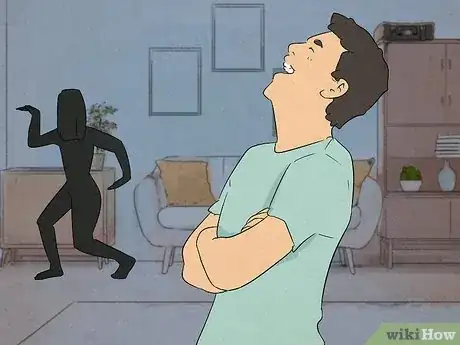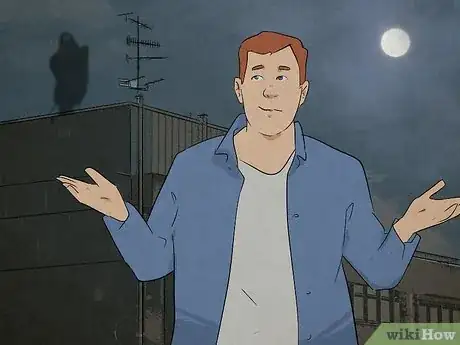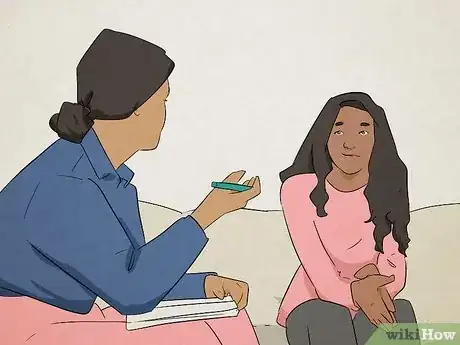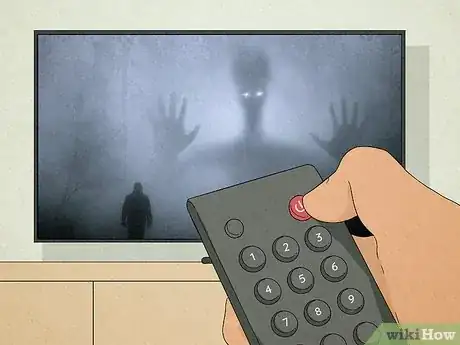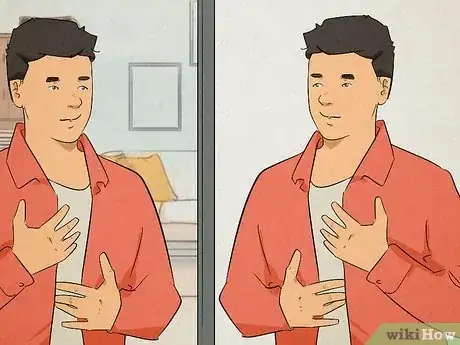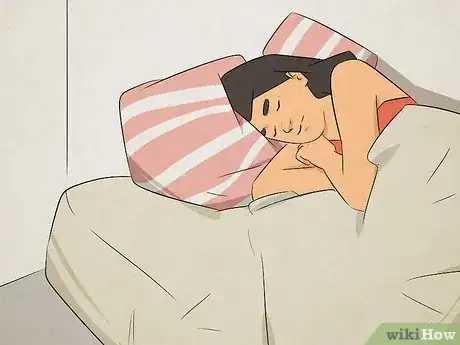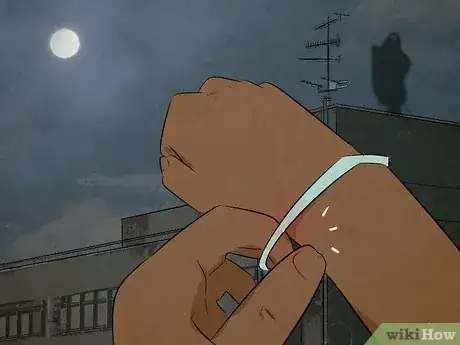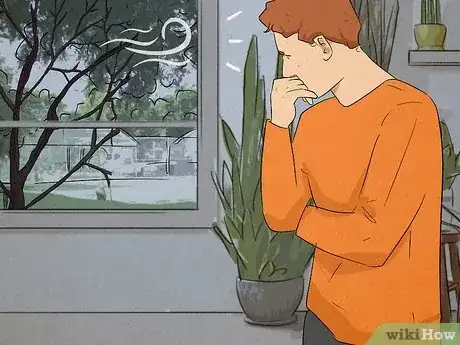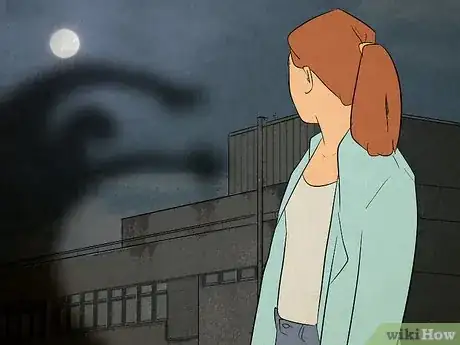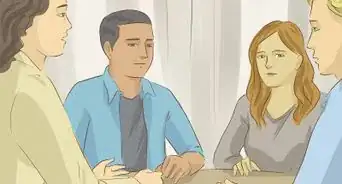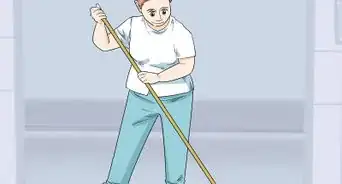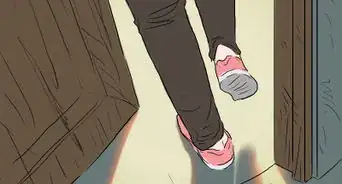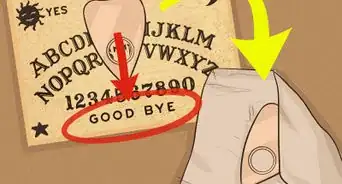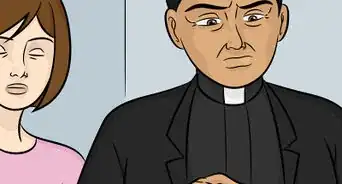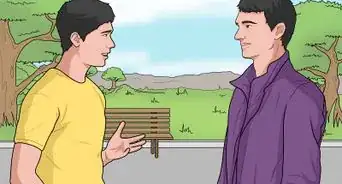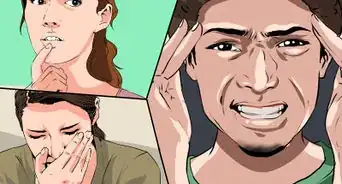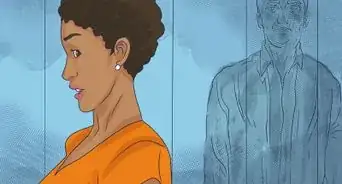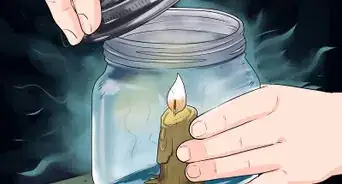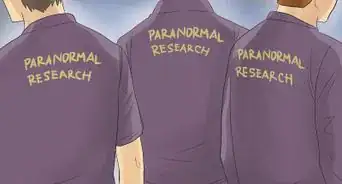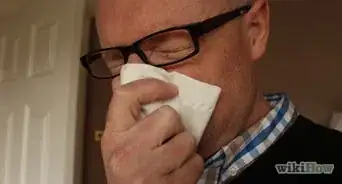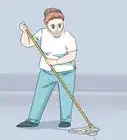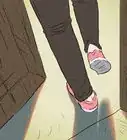This article was co-authored by Jennifer McVey, Cht. Jennifer McVey is a Spiritualist, Seer, and the Spiritual Director of Spiritual Answers and Solutions. With more than 22 years of experience, she specializes in manifesting, ghosts and spirit attachments, hypnotherapy, channeling, and spiritually based life coaching. Jennifer has also published 13 Affirmation Image and six Word Search Puzzle books in spirituality and self-help and has produced over 600 audio sessions.
There are 11 references cited in this article, which can be found at the bottom of the page.
wikiHow marks an article as reader-approved once it receives enough positive feedback. This article has 20 testimonials from our readers, earning it our reader-approved status.
This article has been viewed 336,432 times.
Many people fear the paranormal, whether it's ghosts, telepathic powers, or some other supernatural phenomenon. However, there's really no reason to fear these things. Even though the fear may feel very real, it's important to confront what you're afraid of to take away its power. By disarming your fears, learning to feel safer in your environment, and questioning the world around you, you'll be able to stop fearing ghosts and other paranormal phenomena and start enjoying life in the present moment.
Steps
Overcoming Your Phobias
-
1Confront your fears.[1] If you're afraid of ghosts and you think there's a ghost in your home, your natural reaction is probably to run from it. However, studies show that avoiding your fears will only magnify those anxieties and intensify your reaction.[2] Instead of giving in to your fears, try standing your ground and facing whatever it is you're frightened of.
- Identify what you're actually afraid of and why.[3]
- Ask yourself, "What's the worst possible outcome if these fears were to come true?"
- You should also consider why you have that fear in the first place - most anxieties are based on something much deeper, like a fear of being alone or dying.
-
2Ask yourself reasoning questions.[4] Fear can often be unreasonable, so asking yourself some reasoning questions about the paranormal may help you feel better. If you do not know the answer to a question you pose, do some research and find out. Some questions you might ask yourself include:
- What am I afraid will happen to me if I meet a ghost? Will it try to scare me, say “boo” like a cartoon, or do something annoying like open all the cabinets?
- Am I afraid because of a fictional piece of work, like a scary movie or an urban legend? Am I afraid because of something that is not real?
- How likely is it that there is actually a ghost?
- Can a ghost kill me? Is a ghost capable of harm at all, or is it just scary and annoying?
- Is there a reasonable explanation for what happened that doesn't involve ghosts or the paranormal?
Advertisement -
3Use humor to disarm your fear. Humor is a great way to defuse tense situations and take away the power that a fear has over you. You can use this technique in any situation whenever you're feeling afraid of ghosts or something paranormal.[5]
- Try to make a point of imagining ridiculous, cartoonish ghosts and monsters. The more absurd you imagine these creatures, the less likely you are to be scared of them in the future.
- Whenever you find yourself feeling anxious or fearful, think about how silly you've imagined the creatures you're afraid of. It's hard to be scared of a ghost when you picture ghosts as smiling, goofy caricatures.
-
4Question the existence of ghosts. Once you've broken your fear of ghosts by imagining them as unthreatening beings, you can take another step towards disbelieving in ghosts altogether. Start to question what you believe about ghosts and ask yourself why you believe in these things.[6]
- The easiest way to break your fear of ghosts and the paranormal is to question the proof you have of these phenomena.
- Ask yourself honestly, "What proof do I have that ghosts exist? Or that anything paranormal exists?"
- Try to remember that you've been alive for years and you've never been haunted or attacked by a ghost. If you've made it this far without a real paranormal attack, it's safe to assume that you will never experience one.
- You will quickly realize that most of your "proof" that ghosts exist was based on feelings and intuitions rather than concrete, observable facts. The fact is that while ghost hunters may exist, scientists do not recognize the existence of ghosts.
-
5See a therapist. Sometimes anxiety can be too much to manage alone. If your fear of ghosts and the paranormal is affecting your day-to-day life and you're having a hard time stopping those fears, you may want to consider seeing a therapist.
- Therapy is usually recommended when long-standing fears and anxieties persist or worsen.[7]
- Fear of the paranormal may be related to some traumatic event in your life. A therapist can help you identify the cause of your anxiety and work on resolving the underlying issue(s).
Feeling Safer
-
1Assess your environment. Many people begin to fear ghosts and other paranormal phenomena when they feel unsafe in their immediate environment.[8] For example, you may fear ghosts while walking alone in the park at night if you see a tree's shadow move in the moonlight. The fear puts you on heightened alert, even though there isn't actually anything there. One way to combat that fear is to find ways of reassuring yourself that you're in a ghost-free environment.[9]
- When you're at home, make sure you lock the doors before going to bed at night. That way, if you think you hear something in the middle of the night, you'll know that there's no one inside your home.
- Remove things that may frighten you. For example, if you have tree branches that scrape against the house, trim back the branches so you don't question what that sound is every time the wind blows.
- Don't leave things hanging from the ceiling or in doorways at home. You may see these figures at night and frighten yourself into thinking that they're ghosts.
- Try leaving a nightlight on when you turn the lights out. Having a light source may help disrupt your fears of what might be "lurking" in the dark.[10]
-
2Avoid watching scary movies. You may love horror films, but if you're afraid of ghosts you're better off avoiding the genre. Watching movies about ghosts and paranormal occurrences will only fuel your active imagination and give you more things to worry about.[11]
- If you cannot avoid scary TV shows and movies, make sure you at least avoid watching them for about an hour before you go to bed.
- Giving yourself a break from scary things before going to sleep will make you less likely to lie awake at night thinking about paranormal things.
- Try to watch something light or funny before bed so that you go to sleep relaxed and amused rather than frightened.
-
3Develop a relaxing ritual. Fear of ghosts and the paranormal is often linked to anxiety. When you suffer from anxiety, it can be helpful to fall into a familiar ritual that calms your mind and relaxes your body.[12]
- You can establish a relaxing ritual for any time of day, but at the very least you should find ways to relax before going to sleep.
- Take time to unwind and de-stress, but be consistent in how frequently you follow this routine (ideally on a daily basis). Making your routine familiar helps you know what to expect each day, which can reduce your anxiety and uncertainty.[13]
- You might try taking a warm bath or shower, going for a long walk, or trying relaxation techniques like yoga, meditation, or progressive muscle relaxation.
-
4Build your self-esteem. Another way to help combat anxiety is by boosting your self-image. While this may not seem directly related to your fear of ghosts, studies have shown that boosting your self-esteem can help manage anxiety problems, including anxiety that is related to the paranormal.[14]
- Recognize your strengths and accomplishments. By identifying what you're good at and the things you've achieved, you may start feeling stronger and better about yourself.[15]
- Allow yourself to feel good about your achievements.
- Turn your achievements into self-affirmations. For example, if you feel good about how you played basketball, allow yourself to really believe that you're a good player and a valuable team member.
- You can also build your self-esteem and reassure yourself by telling yourself that you are capable of handling anything, even the unknown.
-
5Reaffirm your safety. At the end of the day, you need to remind yourself that you're safe from harm. Your fear of ghosts is probably tied to a fear of being by yourself, being in the dark, or even a fear of eventual death. By reaffirming that you're safe, you can help combat some of those anxieties when they arise in stressful moments.[16]
- Remember that ghosts aren't real.
- Even if you believed that ghosts were real, they are immaterial beings without physical bodies. Therefore, there is no way that a ghost (if it were real) could actually harm you or anyone else.
- Your fears are most likely linked to some deeper, underlying anxiety that you haven't fully addressed. Managing your anxiety will help you feel safer and break out of your fear of ghosts.
Becoming a Skeptic
-
1Recognize the power of suggestion. Studies show that even skeptics will begin to consider the existence of the supernatural if they believe they are involved in a paranormal investigation. If you're thinking about the paranormal and looking for ghostly explanations, even as someone who does not believe in these things, you will find yourself believing that you've witnessed something supernatural.[17]
- Resist the urge to engage in superstitious activities like crossing yourself, crossing your fingers, knocking on wood, etc.
- Wear a rubber band on your wrist. Whenever you find yourself engaging in ritualistic activities or believing in superstitions, snap the rubber band against your skin to bring your focus back to the present moment.[18]
-
2Look for logical explanations. Most people who think they've seen or heard a ghost do so in relatively unchanging environments where there is very little stimulation. The human brain looks for patterns and is equally capable of looking for breaks in those patterns. When the cause of some disruption cannot be explained, many people assume it is a ghost or something otherworldly.[19]
- There is usually a logical explanation for whatever you're experiencing at any given time. Just because you can't see or understand it, that doesn't mean it's a ghost.
- If you're worried that a ghost is in your home, you're probably just home alone and (subconsciously) looking for any break from the familiarity of your house.
- Some other common scientific explanations for paranormal experiences include atmospheric/geomagnetic activity, altered states of consciousness, stress-induced changes in brain chemistry, and changes in hormone concentrations.
-
3Accept coincidences. Serendipity happens everywhere, every single day. There are many coincidences in the world, some of which you'll have a hard time explaining. However, just because you can't logically explain something, it doesn't mean that the explanation is supernatural or paranormal.[20]
- Remember that there is no such thing as fate, luck, or paranormal intervention. The things that happen in life are governed by chance and the choices you make, not by ghosts.
- Resist the urge to categorize people and situations in advance. Wait until you're experiencing something to decide whether it's good or bad, then reflect on how the opportunity arose (usually through a series of decisions, not anything paranormal).
Expert Q&A
-
QuestionHow can I train my mind to overcome fear?
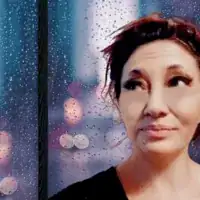 Jennifer McVey, ChtJennifer McVey is a Spiritualist, Seer, and the Spiritual Director of Spiritual Answers and Solutions. With more than 22 years of experience, she specializes in manifesting, ghosts and spirit attachments, hypnotherapy, channeling, and spiritually based life coaching. Jennifer has also published 13 Affirmation Image and six Word Search Puzzle books in spirituality and self-help and has produced over 600 audio sessions.
Jennifer McVey, ChtJennifer McVey is a Spiritualist, Seer, and the Spiritual Director of Spiritual Answers and Solutions. With more than 22 years of experience, she specializes in manifesting, ghosts and spirit attachments, hypnotherapy, channeling, and spiritually based life coaching. Jennifer has also published 13 Affirmation Image and six Word Search Puzzle books in spirituality and self-help and has produced over 600 audio sessions.
Spiritual Director Try to realize that most fears that we have are irrational. If you ever find yourself terrified about something, ask yourself what you are actually afraid of and where that fear is coming from. Remember that ghosts are just people that aren't physically here anymore.
Try to realize that most fears that we have are irrational. If you ever find yourself terrified about something, ask yourself what you are actually afraid of and where that fear is coming from. Remember that ghosts are just people that aren't physically here anymore. -
QuestionWhy are we so afraid of ghosts?
 Jennifer McVey, ChtJennifer McVey is a Spiritualist, Seer, and the Spiritual Director of Spiritual Answers and Solutions. With more than 22 years of experience, she specializes in manifesting, ghosts and spirit attachments, hypnotherapy, channeling, and spiritually based life coaching. Jennifer has also published 13 Affirmation Image and six Word Search Puzzle books in spirituality and self-help and has produced over 600 audio sessions.
Jennifer McVey, ChtJennifer McVey is a Spiritualist, Seer, and the Spiritual Director of Spiritual Answers and Solutions. With more than 22 years of experience, she specializes in manifesting, ghosts and spirit attachments, hypnotherapy, channeling, and spiritually based life coaching. Jennifer has also published 13 Affirmation Image and six Word Search Puzzle books in spirituality and self-help and has produced over 600 audio sessions.
Spiritual Director Because we can't understand them. Sometimes when you're terrified of those ghosts, you actually might be picking up on those ghost feelings more so than your own. They can still communicate the way they used to, but we just can't hear them, and that is kind of unnerving.
Because we can't understand them. Sometimes when you're terrified of those ghosts, you actually might be picking up on those ghost feelings more so than your own. They can still communicate the way they used to, but we just can't hear them, and that is kind of unnerving.
References
- ↑ Jennifer McVey, Cht. Spiritual Director. Expert Interview. 21 December 2021.
- ↑ https://www.psychologytoday.com/blog/insight-therapy/201009/overcoming-fear-the-only-way-out-is-through
- ↑ https://www.betterhealth.vic.gov.au/health/conditionsandtreatments/fear-and-anxiety-children
- ↑ Jennifer McVey, Cht. Spiritual Director. Expert Interview. 21 December 2021.
- ↑ https://www.extension.purdue.edu/extmedia/cfs/cfs-169-w.pdf
- ↑ https://www.psychologytoday.com/blog/rationally-speaking/200908/evening-paranormalists?collection=59621
- ↑ http://my.clevelandclinic.org/childrens-hospital/health-info/diseases-conditions/hic_sleep_in_your_babys_first_year/hic_Strategies_for_Overcoming_Nighttime_Fears
- ↑ https://www.psychologytoday.com/blog/out-the-ooze/201507/why-some-people-see-ghosts-and-other-presences
- ↑ http://my.clevelandclinic.org/childrens-hospital/health-info/diseases-conditions/hic_sleep_in_your_babys_first_year/hic_Strategies_for_Overcoming_Nighttime_Fears
- ↑ https://www.extension.purdue.edu/extmedia/cfs/cfs-169-w.pdf
- ↑ http://my.clevelandclinic.org/childrens-hospital/health-info/diseases-conditions/hic_sleep_in_your_babys_first_year/hic_Strategies_for_Overcoming_Nighttime_Fears
- ↑ https://www.betterhealth.vic.gov.au/health/conditionsandtreatments/fear-and-anxiety-children
- ↑ https://www.extension.purdue.edu/extmedia/cfs/cfs-169-w.pdf
- ↑ http://my.clevelandclinic.org/childrens-hospital/health-info/diseases-conditions/hic_sleep_in_your_babys_first_year/hic_Strategies_for_Overcoming_Nighttime_Fears
- ↑ https://www.psychologytoday.com/blog/the-squeaky-wheel/201604/5-ways-you-can-boost-your-self-esteem
- ↑ http://my.clevelandclinic.org/childrens-hospital/health-info/diseases-conditions/hic_sleep_in_your_babys_first_year/hic_Strategies_for_Overcoming_Nighttime_Fears
- ↑ http://www.bbc.com/future/story/20141030-the-truth-about-the-paranormal
- ↑ http://blogs.psychcentral.com/therapy-soup/2012/08/anxiety-rubber-bands-and-fear-of-flying/
- ↑ Jennifer McVey, Cht. Spiritual Director. Expert Interview. 21 December 2021.
- ↑ https://www.psychologytoday.com/articles/201005/make-your-own-luck?collection=133013
About This Article
To stop fearing ghosts and paranormal phenomena, remind yourself that ghosts and spirits aren’t real so they can’t hurt you. If they were, they would be all over the news! Sometimes our brains imagine things and jump to conclusions because they’re trying to keep us safe. Think about the lack of scientific proof we have for the existence of supernatural beings. If you find yourself feeling scared and imagining ghosts in the house, turn the thought into something funny, like a ghost slipping on a banana or passing gas. If you hear a creepy sound or see a light flicker, ask yourself if there’s a rational explanation, like the wind blowing against the house or an electrical fault. For more tips from our co-author, including how to make your room less frightening, read on.



